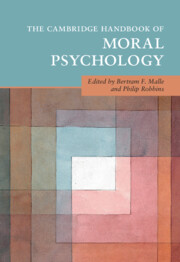Book contents
- The Cambridge Handbook of Moral Psychology
- Cambridge Handbooks in Psychology
- The Cambridge Handbook of Moral Psychology
- Copyright page
- Contents
- Figures
- Tables
- Contributors
- Preface
- 1 Modern Moral Psychology
- Part I Building Blocks
- Part II Thinking and Feeling
- Part III Behavior
- 12 Prosociality
- 13 Antisocial and Moral Behavior
- 14 Intergroup Conflict and Dehumanization
- 15 Blame and Punishment
- 16 Moral Communication
- Part IV Origins, Development, and Variation
- Part V Applications and Extensions
- Index
- References
15 - Blame and Punishment
Two Distinct Mechanisms for Regulating Moral Behavior
from Part III - Behavior
Published online by Cambridge University Press: 20 February 2025
- The Cambridge Handbook of Moral Psychology
- Cambridge Handbooks in Psychology
- The Cambridge Handbook of Moral Psychology
- Copyright page
- Contents
- Figures
- Tables
- Contributors
- Preface
- 1 Modern Moral Psychology
- Part I Building Blocks
- Part II Thinking and Feeling
- Part III Behavior
- 12 Prosociality
- 13 Antisocial and Moral Behavior
- 14 Intergroup Conflict and Dehumanization
- 15 Blame and Punishment
- 16 Moral Communication
- Part IV Origins, Development, and Variation
- Part V Applications and Extensions
- Index
- References
Summary
This chapter of the handbook compares the major moral sanctioning behaviors of blame and punishment from two perspectives: their cultural history and their underlying psychology. The author draws a dividing line between two phases of human evolution – before and after human settlement – and proposes that, before that watershed, moral sanctions were informal, nonhierarchical, and often mild, akin to today’s acts of moral blame among intimates. Soon after settlement, hierarchies emerged, in which punishment took hold as a new form of sanctioning, typically exacted by those higher up in the hierarchy, and eventually by institutions of punishment. The author reviews the empirical evidence on the cognitive and social processes underlying each of these sanctioning tools and proposes that their distinct cultural histories are reflected in their psychological properties we can observe today. Whereas blame is, on the whole, flexible, effective, and cognitively sophisticated, punishment is often more damaging, less effective, and can easily be abused – as in past and modern forms of institutional punishment.
- Type
- Chapter
- Information
- The Cambridge Handbook of Moral Psychology , pp. 354 - 381Publisher: Cambridge University PressPrint publication year: 2025

